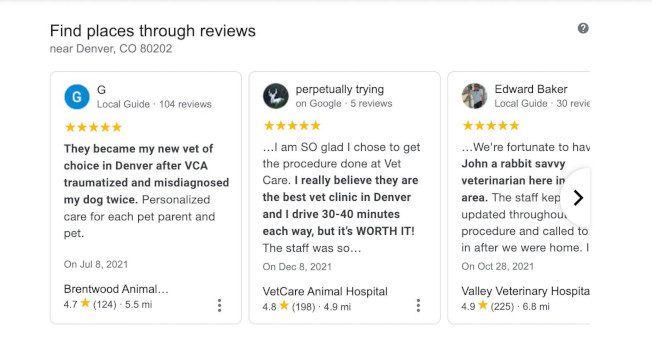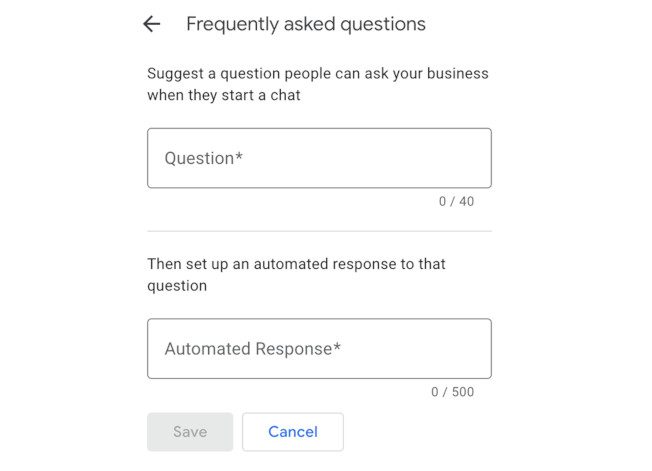
 Google-calls-time-on-the-gbp-app-an...
Google-calls-time-on-the-gbp-app-an... 
The world of local search rang in the changes this July. Google was particularly active as it bade farewell to a major app, pushed out a few new features, and took steps to counteract a particularly worrying new scam. Here’s all the news you need to know.
Say goodbye to the Google My Business app
Multiple warnings led up to this moment and now it’s official: Google is sunsetting its Google My Business (GBP) app. Along with the name change to Google Business Profile (from Google My Business), all features once exclusive to the app are now available on standard Google Search and through the Google Maps app.

Image: Google
Those who try to access the Google My Business app will now receive a message stating that it is no longer available, and will be presented with links directing them to Search and Maps. All former functionality is transferred to these platforms and account managers should not lose any of their archived data.
1-star reviews plague restaurants on Google
As covered by the New York Times, scammers are leaving 1-star reviews for restaurants (and other businesses) then demanding gift cards in order to edit or remove said reviews. For businesses that rely heavily on their online reputation, the threat of losing foot traffic over negative reviews often sees them paying the scammer. The formal process to remove fraudulent reviews can take time, so it seems that some business owners are opting to pay off scammers rather than absorb the potential loss in revenue from weeks of a visible 1-star review.
This review scam spread widely enough to warrant an official response from Google:
We’ve recently become aware of a scam targeting businesses on Google with the threat of 1-star reviews unless they send money via gift cards. Our policies clearly state reviews must be based on real experiences, and our teams are working around the clock to thwart these attacks, remove fraudulent reviews, and put protections on business profiles that may have been affected.
If your business is being targeted by these scammers, please do not pay them. Instead, please flag the reviews here or reach out to Google support via our Help Center, so that our team can review and remove policy-violating content. If you haven’t yet claimed your business profile, you can do so here.
“Find places through reviews” on Google
Despite its many problems, Google is succeeding in becoming one of the largest review platforms online. While trying to fight back against the negative aspects of its reviews, the search giant is also trying to promote its wealth of positive content.
In its latest attempt to leverage its large volume of quality reviews, Google is slowly introducing a new method to highlight reviews in local search: a new feature named “Find places through reviews”. This new tab will show a review carousel for select local businesses that match the user’s search query. For example, if a user searches for a “coffee shop with free Wi-Fi”, Google will present reviews that specifically mention the quality of the establishment’s free internet.

Image: Search Engine Roundtable
Regardless of what issues Google may face while trying to become the internet’s number one review platform, it is dedicated to its goal of making reviews one of the most important factors for every business listed on the search engine.
Google tests “Reviews aren’t verified” label
While Google seems to handle fake reviews better than platforms such as Facebook, it’s estimated that approximately 11% of Google reviews are fake. While that number may seem tolerable, this totals to about 200 million fake reviews on the platform.
That’s why Google is testing a new label to indicate when a review isn’t verified on Search or Maps. Appearing above a review, the label reveals on click that “reviews aren’t verified by Google, but Google checks for and removes fake content when it’s identified.”
This label should appear when Google can’t confirm the reviewer physically visited a business or made a purchase through their online store. While this method has succeeded in the past, such as when Google removed old reviews from businesses that the reviewer hadn’t visited for over 6 months, there have also been problems. When Google attempts to delete fake reviews, partly using machine learning, it often removes a significant number of legitimate reviews as well. With the balance between these two factors a difficult one to achieve, Google will need to constantly tweak its algorithms to avoid issues like the 1-star restaurant scam in the future.
Google lets businesses set auto responses to common questions
For businesses that have set up messaging on GBP, Google now includes automatic responses to commonly asked questions. The FAQs that businesses often set up in their Google Q&A can now be repurposed for messages. Much like a chat bot, if a user asked a common question such as “Is parking available?”, Google’s automated responses can reply with a prewritten message on the topic.

Image: Google
Because GBP messenger can be turned off for businesses with less than a 90% response rate, this auto-response feature will greatly assist businesses to remain within that threshold. To set up this new feature, business managers will need to populate the list of potential questions and answers under the FAQs portion of the messaging section.
Local search moves fast, but our dedicated teams move faster. Find out how we’re driving outrageous growth for our clients via proprietary technology, hands-on management, and a unique suite of performance marketing services. Let’s talk!
